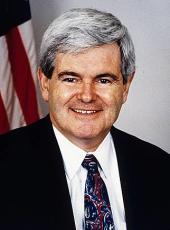Growth and Prosperity Rather Than Austerity
By Newt Gingrich
CNBC.com
 The best and most effective way to balance the budget is through booming economic growth and prosperity. I know. That is how we did it the last time we balanced the budget, when I was Speaker of the House, and it stayed balanced for four straight years.
The best and most effective way to balance the budget is through booming economic growth and prosperity. I know. That is how we did it the last time we balanced the budget, when I was Speaker of the House, and it stayed balanced for four straight years.
We produced, in fact, four straight record budget surpluses, totaling $560 billion over those 4 years. You can check the historical record yourself at omb.gov.
We achieved that not by raising taxes in return for supposed spending cuts, but by cutting tax rates to create booming growth, and cutting spending. The growth then booms tax revenues past the level of reduced spending.
And that is how we would do it again if I am elected President. I have already proposed the most aggressive, pro-growth, supply side tax reform agenda, which Ronald Reagan's chief economist Art Laffer has endorsed as the best of any candidate's tax reform plans. That includes an optional 15% flat tax for individuals, a 12.5% corporate tax rate, zero capital gains, zero death tax, and immediate expensing for new investment in plant and equipment.
We have already had the plan professionally scored by Fiscal Associates. They project as a result average, annual, real economic growth over the first 10 years of 4.4%, almost twice what CBO projects under Obamanomics, catching up to restore America to the long term, postwar, economic growth trendline from 1947 to 2007. That growth would produce 6.6 million new jobs in the first two years alone, consistently with the results of the similar policies of Reaganomics, and reduce the unemployment rate within my first term to 4.6%.
With the revenues from the growth the plan would produce, along with reasonable spending reductions, we can balance the budget in four years. When I was Speaker, we balanced the budget within 3 years of adopting the deficit reduction plan, even though we were aiming for 7 years, because the economy boomed so much in response.
Just by returning spending for every budget line item, and that means all of them except for Social Security, Medicare, Medicaid, defense, debt interest and federal retirement, back to 2007 levels, we would save over $500 billion in spending a year right there. We would then freeze discretionary spending for long enough, and adopt whatever other spending cuts from Paul Ryan's budget and Simpson-Bowles are necessary, to balance the budget within my first term.
That budget balance would be maintained over the long run by the sweeping entitlement reforms I have specified in great detail at Newt.org, which entitlement reform expert Peter Ferrara estimates would ultimately reduce federal spending by half as a percent of GDP from what it would be otherwise.
Central to those entitlement reforms would be empowering each worker with the freedom to choose personal savings, investment, and insurance accounts in place of at least some of Social Security to start. That has worked so spectacularly for over 30 years now in the South American nation of Chile, and right here in America for local government workers in and around Galveston, Texas. I propose to expand that option over time until the personal accounts ultimately can pay all of the benefits now financed by the payroll tax, ultimately replacing that tax entirely with a personal family wealth engine. That would amount to the greatest reduction in taxes in world history.
The Chief Actuary of Social Security has officially scored legislation providing for such personal accounts as achieving full solvency for Social Security, without benefit cuts or tax increases. Instead, because real, long term, market investment returns are so much higher than what Social Security even promises, let alone what it can pay, future seniors would enjoy higher not lower benefits.
In the process, such accounts would produce the most dramatic reductions in government spending in world history. That is because instead of trimming benefits, the accounts would shift vast realms of federal spending out of the federal budget altogether, and into the private sector.
Rick Santorum says he supports such accounts, but not now because supposedly America, unlike Chile and other countries in South America and elsewhere, can't afford them. That is because he sees the money going into the accounts as a cost to the economy, rather than the mighty rivers of savings and investment further fueling economic boom that they really are.
Mitt Romney proposes instead to slash future promised benefits by as much as 30% for those deemed higher income retirees, a bit less for middle income retirees. And he would delay the retirement age besides. With personal accounts, each worker chooses his or her own retirement age, with market incentives to choose to delay it as long as possible. Rick Santorum supports the same benefit cut austerity as Romney but applied immediately, to today's seniors, perhaps getting around to pro-growth personal accounts eventually.
Indeed, both candidates offer too much austerity and pain as their economic recovery programs and not enough pro-growth tax, regulatory and monetary reform. They can say that they will create jobs and economic growth, but for the both of them that is only rhetoric, without specific proposals that would actually create booming economic growth like Reagan did.
We cannot balance the budget and grow our economy with economic policies of austerity and pain. That requires instead the vision and boldness to make the fundamental changes necessary for booming economic growth and prosperity.
Newt Gingrich, Gingrich Campaign Press Release - Gingrich Outlines Plan to Balance the Budget Online by Gerhard Peters and John T. Woolley, The American Presidency Project https://www.presidency.ucsb.edu/node/300382

